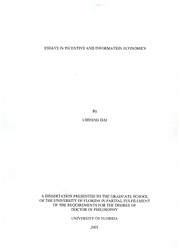
Essays in incentive and information economics PDF
Preview Essays in incentive and information economics
ESSAYSININCENTIVEANDINFORMATIONECONOMICS By CHIFENGDAI ADISSERTATIONPRESENTEDTOTHEGRADUATESCHOOL OFTHEUNIVERSITYOFFLORIDAINPARTIALFULFILLMENT OFTHEREQUIREMENTSFORTHEDEGREEOF DOCTOROFPHILOSOPHY UNIVERSITYOFFLORIDA 2003 ACKNOWLEDGMENTS I am especially grateful to the chairman ofmy dissertation committee, David Sappington, forhis patient guidance, helpful suggestions and insightful comments. I thankChunrongAi,JoelDemski,JonathanHamilton,TracyLewis,andStevenSlutsky fortheirvaluablesuggestionsandcommentsonmyresearch.Financialsupportfroma Walter-Lanzillottiresearchgrantisalsogratefullyacknowledged. 11 TABLEOFCONTENTS Page ACKNOWLEDGMENTS ii CHAPTERS 1 INTORDUCTION 1 2 OPTIMALCONTRACTINGWITHWEALTH-CONSTRAINEDOPERATORSOF UNKOWNABILITY 5 2.1 Introduction 5 2.2 ElementsoftheModel 7 2.3 PropertiesoftheOptimalContract 9 2.3.1BenchmarkSolution 9 2.3.2TheOptimalContract 12 2.4 Conclusion 20 2.5 Notes 21 3 THEAPPEALSPROCESSININCENTIVEPROBLEMS 23 3.1 Introduction 23 3.2 TheModel 27 3.3 TheOptimalContractwithPerfectEvaluation 29 3.4 TheOptimalContractwithImperfectEvaluation 30 3.5 TheAppealsProcess 35 3.5.1CostlessAppealsProcess 40 3.5.2CostlyAppealsProcess 42 3.6 Conclusion 50 3.7 Notes 51 4 SELECTINGCOSTDISTRIBUTIONS 53 4.1 Introduction 53 4.2 TheModel 55 4.2.1DescriptionofBuyerandSeller 55 4.2.2ContractingforSupply 58 4.2.3TimingoftheModel 58 4.3 Seller'sPreferencesforDistribution 59 4.4 OptimalContracts 62 iii 4.5 Buyer'sPreferencesforContractingwithSellers 69 4.5.1Buyer'sPreferencesforDistribution 69 4.5.2Buyer'sPreferenceforExAnteKnowledgeofSeller 71 4.6 Conclusion 74 4.7 Notes 75 5 CONCLUSION 76 APPENDICES PROOFOFPROPOSITIONSINCHAPTER2 81 PROOFOFPROPOSITIONSINCHAPTER3 91 PROOFOFPROPOSITIONSINCHAPTER4 105 LISTOFREFERENCES 110 BIOGRAPHICALSKETCH 114 IV AbstractofDissertationPresentedtotheGraduateSchool oftheUniversityofFloridainPartialFulfillmentofthe RequirementsfortheDegreeofDoctorofPhilosophy ESSAYSININCENTIVEANDINFORMATIONECONOMICS By ChifengDai August2003 Chair:DavidSappington MajorDepartment:Economics MydissertationstudiesissuesinInformationandIncentivesEconomics.Chapter 1examineshowaprojectowneroptimallyselectsaprojectoperatorandmotivateshimto deliverunobservableeffortwhenpotentialoperatorsarewealth-constrained.Ishowthat eitherapoolingoraseparatingcontractcanariseinequilibrium.Inaseparatingcontract, themorecapablepotentialoperatoriseitherselectedmoreoftenbutawardedasmaller shareofprofit;orselectedlessoftenbutawardedalargershareofprofit. Theappealsprocessisusedinmanyorganizations(includingadministrative agencies,sportsorganizations,regulatoryauthorities,companies,etc.).Chapter2 examinestheeffectoftheappealsprocessonincentivecontractsinthepresenceof imperfectperformanceevaluationandlimitedliability.Somesurprisingresultsemerge. Forexample,appealsmaybedeniedeveniftheappealsprocessisquiteaccurateand costless.Furthermore,theappellantbearsallthecostofanyappeals.Also,anagentmay bepaidmoreinitiallyforminimumperformancethanforsuperiorperformance.Under v certainconditions,anincreasedaccuracyofinitialobservationmayreducewelfare. Welfarecanalsoincreaseasthecostoftheappealsprocessincreases. Chapter3analyzeshowabuyeroptimallycontractswithasellerwhoisprivately informedabouthislikelycosts.Eventuallythesellermaylearnmoreabouthisactualcost aftersigningthecontract.Idemonstratethatsellerspreferriskiercostdistributions. Optimalcontractsoffersellerswithriskiercostdistributionsgreaterdiscretionin choosingoutputlevels,whereasproductionchoicesaremorerestrictedforsellerswith morecertaincostdistributionsintendedtoextractrentsfromriskiersellers.Thebuyer alsopreferscontractingwithsellerswithriskiercostdistributions.However,insome settings,thebuyerpreferssellerstobeuninformedabouttheircostdistributions. vi CHAPTER 1 INTRODUCTION Optimalcontractsinthepresenceofmoralhazardandadverseselectionhave receivedconsiderableattentionintheliterature.However,moststudiesignorewealth constraints.Inpractice,economicpartiesoftenarewealth-constrained.Forexample, CEOsinlargecorporationsusuallyhavelittlewealthrelativetotheassetstheycontrol. Entrepreneurstypicallylackthefundsrequiredtodevelopandmarkettheirown inventions;andsoseekthefinancialsupportofventurecapitalists.Therefore,itis importanttoexamineoptimalcontractsinthepresenceofwealthconstraints.Chapter2 examineshowaprojectowneroptimallyselectsaprojectoperatorandmotivateshimto deliverunobservableeffortwhenpotentialoperatorshavelimitedwealthandprivate knowledgeoftheirability. Idemonstratethatwealthconstraintsinfluenceoptimalcontractsintwo fundamentalways.First,wealthconstraintspreventtheprojectownerfromreceivingthe fullvalueoftheproject.Furthermore,profitsharingresultsinequilibrium,which diminishestheeffortsuppliedbytheoperator.Second,wealthconstraintscanpreventa high-abilitypotentialoperatorfromoutbiddinghislow-abilitycounterpart.Asaresult, theprojectsometimesisassignedtoanoperatoroflowerability.Together,thesetwo effectsimplythatwealthconstraintsgiverisetodilutedincentivesandexpostallocation inefficiencyintheequilibrium.Further,Ishowthatwhentheabilitiesofpotential operatorsarecommonknowledge,theprojectowneralwaysselectsthemorecapable potentialoperator.However,theoperator’sshareofrealizedprofitcaneitherincreaseor 1 2 decreasewithhisability,dependingonthenatureofhisproductiontechnology. When potentialoperatorsareprivatelyinformedabouttheirabilities,eitherapoolingora separatingcontractcanariseinequilibrium.Thenatureoftheoptimalcontractvaries withtheelasticityofanoperator’sexpectedprofitofoperationwithrespecttothe paymentforsuccess.Inaseparatingcontract,themorecapablepotentialoperatoris eitherselectedmoreoftenbutawardedasmallershareofprofit,orselectedlessoftenbut awardedalargershareofprofit. Performanceisoftendifficulttomeasureperfectlyinpractice.Forexample,the levelofairportsecurity,thefinancialhealthofafirm(e.g.,EnronandWorldCom),the damagecausedbyhazardouswastes,andtheimpactofemployees’misconductareall difficulttomeasure.Consequently,incorrectjudgmentsabouttheactivitiesofeconomic actorsmayarise,andresultinincorrectdecisions.Intheprincipal-agentliterature,while moststudiespresumethattheprincipalcanobservetheagent’sperformanceperfectly, somestudiesshowthattheinabilitytoobserveperformanceperfectlyisnotconstraining. Forexample,Picard(1987),RiordanandSappington(1988),andCaillaud,Guesnerieand Rey(1992)showthattheprincipalcanachieveefficientoutcomesandfullyextractthe rentofarisk-neutralagentaslongastheprincipalcanobserveasignalcorrelatedwith theagent’sprivateinformation.However,suchaconclusionisnotobtainablewhenthe agent’sliabilityislimited.Legalorinstitutionalrestrictionsoftenpreventanemployer fromimposingalargepenaltyonemployees.Forexample,Dickens,Katz,Langand Summers(1989)said“AnimportantaspectofAmericanandEnglishcommonlawisthe refusalofthecourtstoenforcecontractprovisionsthatarefoundtobe‘penalties’.In 3 particular,contractprovisionscallingfor‘liquidateddamages’forbreachofcontractthat exceedsthelosscausedbythebreachareviewedaspenaltiesandnotenforced.” Chapter3examinestheeffectoftheappealsprocessonoptimalincentivecontracts inthepresenceofimperfectperformanceevaluationandlimitedliability.Many organizations,suchasadministrativeagencies,sportsorganizations,regulatory authorities,andcompanies,useanappealsprocesstoallowanagenttochallengea principal’sjudgment.Istudythefollowing: • Conditionsunderwhichitisoptimaltoimplementanappealsprocess. • Theoptimalallocationofthecostofanappealbetweentheemployerandthe appellant. • Optimalrewardsinanappealsprocess. • Theeffectofthecostoftheappealsprocess. • Theeffectoftheaccuracyofinitialobservationsandtheappealsprocess. Instandardadverse-selectionproblems,supplierstypicallyareassumedtohave perfectprivateinformationabouttheircostswhencontracting.Inpractice,though,a supplieroftenpossessesonlyimperfectinformationwhenhesignsacontractormakesa productiondecision.Forinstance,builderscanonlyestimatethecostofmaterialswhen negotiatingaconstructioncontract.Similarly,healthcareprovidersknowonlythe distributionofcostsfortreatingapopulationofpatientswhencontractingwithhealth insurers.Chapter4studieshowabuyeroptimallyarrangesfortheexchangeofgoods withasellerwhoisprivatelyinformedabouthiscostdistributioninsteadofhisactual costatthetimeofcontracting.Thisadverseselectionproblemraisesnewandinteresting questions:First,whatistheseller'spreferenceregardingdifferentcostdistributions? Second,arethepreferencesofthebuyerandthesellerregardingdifferentcost 4 distributionsalignedorinconflict?Third,doesthebuyerprefercontractingwithan informedsellerorwithaselleruninformedabouthiscostdistributions? Iexaminetheseissuesandthepropertiesofoptimalcontractsintwodifferent environments.Theenvironmentsdifferprimarilyinthenatureoftheseller'sinformation whenhesignsthecontractandwhenhemakesproductiondecisions.Inthefirst environment,costsarerevealedsequentiallytotheseller.Atthetimeofcontracting,the sellerisprivatelyinformedabouthiscostdistribution.Eventually,justbeforeproduction, thesellerobservesaperfectsignalthatrevealshisexactcost.Inthesecondenvironment, thesellercannotobservehisexactcostbeforeproduction.However,heobtainsan imperfectsignalofhiscostbeforeproduction.Atthetimeofcontracting,theselleris privatelyinformedaboutthedistributionofthesignal.Inbothsettings,thebuyeris unabletoobserveeitherthecost(signal)distributionortherealizationoftheeventual signalthesellerreceives.
